INTRODUCTION
According to the World Health Organization, depression remains the leading contributor to the global burden of disability and premature mortality, and this impact was reported to have escalated during the COVID-19 pandemic [1–4]. The main therapy for depression is medication, and pharmacists therefore play a key role in managing medication for these patients [5,6]. Community pharmacists (CPs) as accessible healthcare professionals can provide counseling and management services for antidepressant medications. These interventions can improve patient outcomes, such as their understanding of their mental health condition, adherence to medication regimens, treatment acceptability, and quality of life [7].
The COVID-19 pandemic in Indonesia has contributed to a 64.3% increase in reported mental health problems, which were driven by both the impact of the disease itself and associated socioeconomic [8]. Furthermore, depression has shown the highest prevalence across the population over the past three decades [9]. To address this issue, the Indonesian government has proposed a training program for health professionals who do not specialize in mental health, which is in line with the WHO’s recommendations [10,11]. However, CPs are often not involved in these mental health programs and training due to budget constraints and a shortage of pharmacist staff [12]. Furthermore, a lack of mental health training is the most significant barrier to CPs, which contribute to a lack of confidence and poor knowledge and skills to provide appropriate care for patients with mental disorders [12–15].
Several studies report that mental health training for CPs has been done in such countries as the United States [16,17], Australia [18–20], Canada [21], Japan [22], and Belgium [23,24]. However, there are limited data for this training in developing and low- to middle-income countries [25]. In addition, there is a lack of such programs in Indonesia and other Southeast Asian countries, where depression is highly prevalent. Meanwhile, mental health training for CPs has been found to improve their attitude, knowledge, and competence in caring for patients with mental health conditions [16,25,26]. Therefore, providing depression-specific training for CPs in Indonesia can potentially bridge this gap and improve their ability to support patients with depression.
A depression training program (DTP) has been developed based on need assessments and implemented to CPs in Indonesia. Therefore, this study aims to evaluate the effectiveness of the DTP in improving depression literacy, self-efficacy, and communication skills as well as in reducing stigma among CPs in Indonesia. This study recommends that the Ministry of Health of Indonesia further legalizes training and education for pharmacists to improve pharmaceutical services for people with depression.
METHODS
Study design
This quasi-experimental study used a pretest and posttest non-equivalent groups design conducted for 3 months from December 2023 to February 2024. The study received ethical clearance from the Medical and Health Research Ethics Committee of Gadjah Mada University (number KE/FK/1554/EC/2022), and the participants gave their informed consent through online platforms.
Study population
To be included in the study, the pharmacists had to work in a pharmacy, a clinic, or a primary health center in Daerah Istimewa Yogyakarta Province and be legally registered to practice pharmacy in Indonesia. The sample size was calculated using the G*Power 3.1.9.2, with a 2-tailed alpha of 0.05, a power of 0.9, and a large effect size of 0.8. This indicated a required sample size of 50 per group. The study included 60 participants in the control group and 60 in the intervention group with convenience sampling.
Data collection
First, a pretest was conducted on December 6, 2023 for both the experimental and control groups to evaluate the CPs’ literacy, self-efficacy, and level of stigma. The self-efficacy was measured by using the Provision to Provide Pharmaceutical Care for Patients with Mental Illness questionnaire developed by Marshal E Cates in 2005 [27]. The CPs’ stigma was measured by the Stigma Scale for Community Pharmacists developed by Fujii et al. in 2021 [22]. The literacy was measured with the Depression Literacy Questionnaire by Griffiths et al. updated in 2022 [28]. On January 6, 2024 or a month later, the members of the experimental group underwent 9 hours of DTP at the Faculty of Pharmacy, Gadjah Mada University. The participants who joined the experimental group received incentives after completing all the training sessions. A posttest was conducted a month after the training for both groups with the same checklists used in the pretest on February 6, 2024. Both the pretest and posttest were done online via Google Forms. All the participants received continuing professional development points at the end of the study, and the participants in the control group were given the online training material as a reward.
Intervention
The DTP was developed based on a need assessment of CPs in Indonesia and a systematic literature review [25] that identified the key competencies required for CPs to identify, manage drug therapy, and communicate with depression patients effectively (Table 1). The explanation of the need assessment and development of DTP is described in another paper.
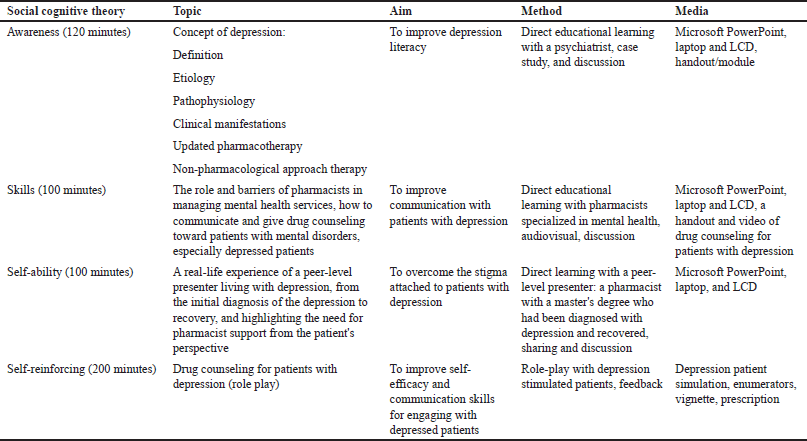 | Table 1. Depression training program of community pharmacists in Indonesia. [Click here to view] |
Data analysis
The IBM SPSS version 27.0 (IBM Crop.) was used for data analysis. Given the lack of randomization of participant selection, the confounding factors such as sociodemographic variables needed a statistical analysis to show no significant differences between the intervention and control groups to minimize bias [29]. The t-tests and Pearson’s chi-squared tests were used to determine differences in demographic variables, such as gender, age, workplace, educational degree, and years of community pharmacy experience, between the intervention and control groups (p > 0.005). After these sociodemographic variables were analyzed, the effects of the intervention were examined by comparing the outcomes of the groups in terms of the stigma, self-efficacy, and literacy (p < 0.005). The paired t-tests and Wilcoxon tests were then used to compare the mean score differences between time points for the intervention and control groups (p < 0.005). Lastly, the pretest became a potential confounding variable because both the intervention group and control group underwent pretest and posttest evaluations with the same instrument. To address this, the ANCOVA test was used to compare the outcomes between the groups and to account for the pretest as a covariate (p < 0.005). The inclusion of this analysis could improve the statistical power of this study [29].
RESULTS
A total of 120 participants completed the study, with 60 participants in each of the control and intervention groups. The majority of the participants in the control and intervention groups were female, accounting for 90% and 91.7%, respectively. Most of the pharmacists in the intervention and control groups worked in a pharmacy, with 66.7% and 60%, respectively. However, the pharmacists in the intervention group had more work experience than those in the control group (Table 2).
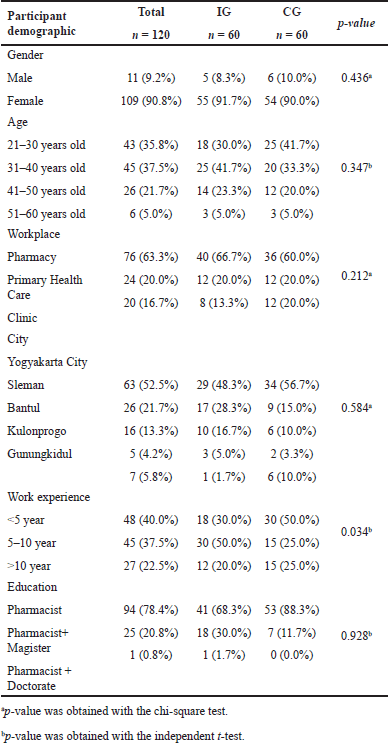 | Table 2. Participants demographic. [Click here to view] |
Comparison of the CPs’ self-efficacy in providing pharmaceutical care for patients with depression before and after DTP
As shown in Table 3, there was a significant difference in the intervention pharmacists’ data gathered by the study group. They felt more confident, showed more interest, and were comfortable about providing pharmaceutical care for patients with depression compared to those in the control group. However, both groups did not demonstrate significant differences in the interest in screening pharmacotherapy and monitoring effects (Table 3).
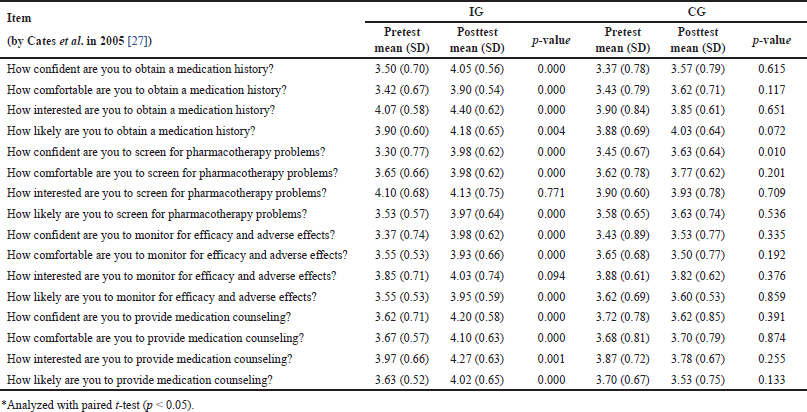 | Table 3. Comparison of self-efficacy of community pharmacists before-after the DTP. [Click here to view] |
Comparison of CP’s view on stigma of patients with depression before and after DTP
Table 4 shows that the majority of the participants in the intervention group and control group showed no significant differences in the 1-month follow-up with regard to the overall stigma in the pretest and posttest. However, the paired t-tests revealed that the pharmacists in the intervention group significantly decreased their social distance regarding their concerns about administering and advising on medication for patients with depression (p = 0.002). They also showed a more positive attitude and perception toward these patients by recognizing their efforts to improve their conditions, reintegrate into society without difficulties, and overcome the negative perception that patients with depression are dangerous (p = 0.010, p = 0.007, and p = 0.017, respectively). In addition, the pharmacists in the intervention group did not only exhibit less personal-social distance. They did not mind if a patient with depression lived next door, and they allowed their children to sit near these patients (p = 0.036 and p = 0.030, respectively). Similarly, the pharmacists in the control group had a decrease in social distance. They had a better perception that patients with depression were working hard enough to improve their conditions, and they remained befriended with them at work even if they were diagnosed with depression (p = 0.17 and p = 0.035, respectively) (Table 4).
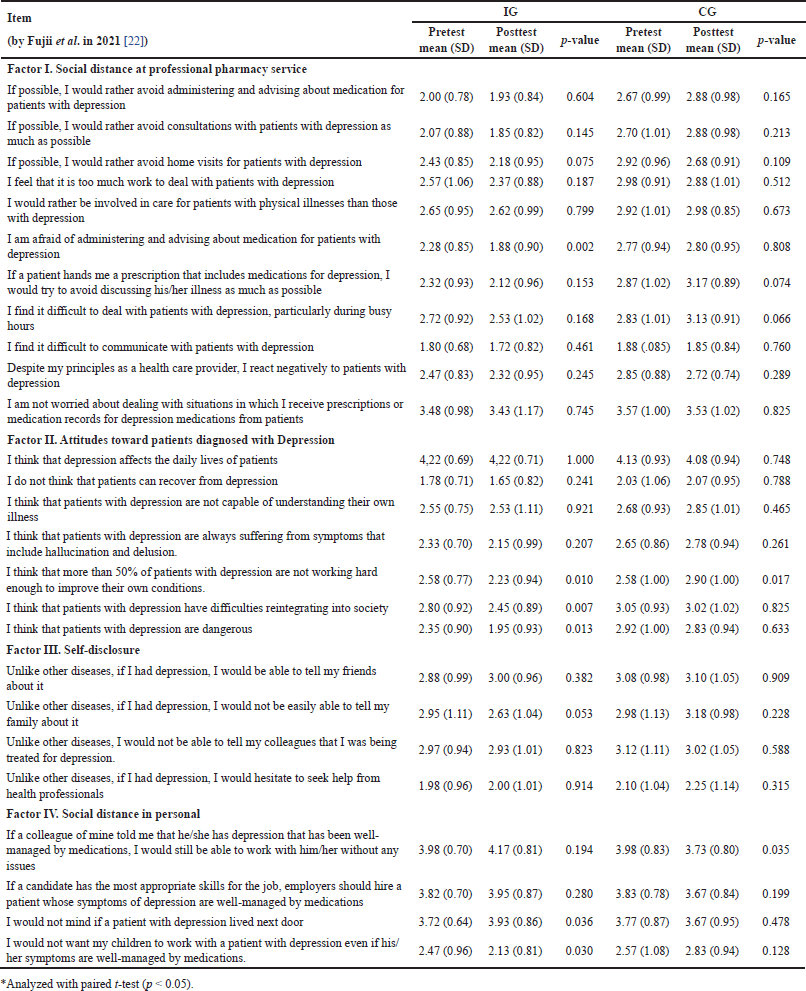 | Table 4. Comparison of stigma toward patients with depression among community pharmacists before and after the DTP. [Click here to view] |
Comparison of depression literacy among CP’s before and after DTP
Table 5 shows that the participants in the intervention group showed better improvement in depression literacy compared with those in the control group. However, the pharmacists in the control group also increased their knowledge of symptoms and treatment for patients with depression (p = 0.001, p = 0.007, and p = 0.045, respectively) (Table 5).
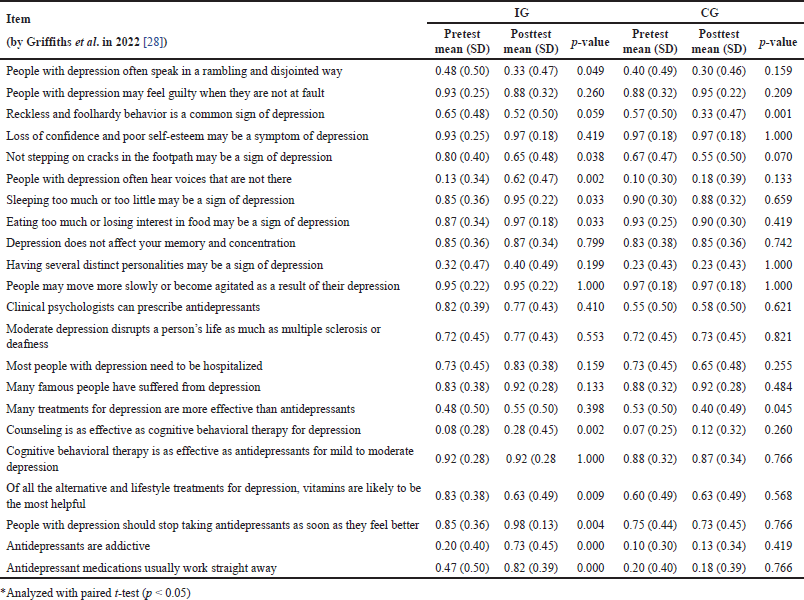 | Table 5. Comparison of depression literacy among community pharmacists before and after the DTP. [Click here to view] |
Effectiveness of DTP in reducing stigma and improving depression literacy and self-efficacy of CPs
Table 6 shows significant differences in all variables between the experimental and control groups in both the pretest and posttest. The p values shown in the last column were from the paired t-tests and Wilcoxon signed-rank tests, thus illustrating the pretest versus posttest changes within the experimental or control group after the intervention. The participants in the experimental group reported significant improvement in depression literacy, with stigma and self-efficacy (p = 0.000), while no change was found in the control group (Table 6).
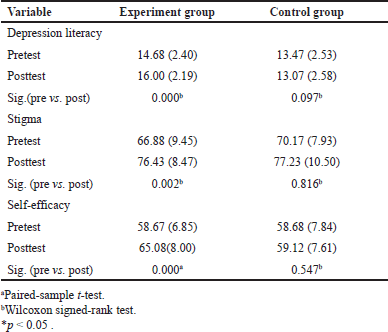 | Table 6. Comparison of pretes and posttest between experimental and control groups and the change after intervention for the two groups. [Click here to view] |
Effects of pretest on intervention’s outcome
Table 7 shows the results of (Quade’s) ANCOVA with the pretest scores as covariates. Compared with the control group, the experimental group reported significantly better literacy, self-efficacy, and stigma after the intervention (p = 0.000) with a medium improvement in literacy (η2 p = 0.247). However, the improvement in self-efficacy and stigma reduction was considerably small (η2 p = 0.183, η2 p = 0.133, respectively). Furthermore, there were effects of interaction on the pretest as a confounding factor (Table 7).
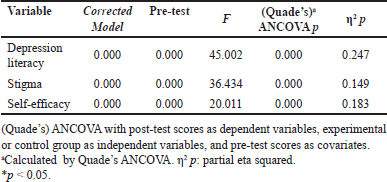 | Table 7. The effects of the intervention on measured outcomes. [Click here to view] |
Communication skills of CPs
In this study, only the communication skills of the participants in the intervention group (n = 60) were measured. As seen in the result, even though the total performance of communication skills of the CPs was fair (mean = 0.7), there was a discussion session for developing treatment plans, in which the CPs were found to have low scores (mean = 0.283) (Table 8).
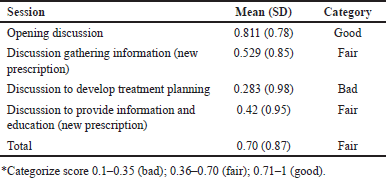 | Table 8. Communication skills scores of community pharmacists. [Click here to view] |
DISCUSSION
To the best of our knowledge, this is the first study to evaluate the effectiveness of DTP on pharmacists in Indonesia. The key finding of this study was that participation in DTP was effective in improving depression literacy and self-efficacy and in reducing stigma among CPs. Furthermore, some improvements in those qualities were also sustained in the 1-month follow-up.
Consistent with the findings of this study, evidence from other studies shows that pharmacists who participate in mental health training have been found to show increased knowledge and reduced stigma toward patients with mental disorders [15,16,22,25]. However, studies that evaluate the effectiveness of depression training for pharmacists remain limited. Such studies were dominantly conducted in developed countries, leaving only limited data being found about similar studies in low-to-middle-income countries, particularly in Asia. Furthermore, the measurement of the stigma and knowledge in those studies was directly conducted after the intervention [22]. Therefore, the present study extends the literature by demonstrating that DTP among CPs can have a positive impact on known barriers to serving pharmaceutical care to patients with depression. Such intervention, which features a peer-level presentation, an education session with a psychiatrist and mental health pharmacist, and a video role-play demonstration, successfully influences pharmacists’ attitudes and beliefs.
Furthermore, several studies report that pharmacists have negative attitudes and high social distance toward patients with depression [7,30]. In line with this finding, this study found that the pharmacists who did not receive training showed no difference in reported depression care between baseline and post-intervention measurements. In addition, the pharmacists in both the intervention group and the control group showed less interest in screening pharmacotherapy and monitoring effects and adverse effects in depression patients. The study indicates that there remains an area to be improved. This result corroborates those of the studies by Liekens et al. [23] and Greenhill et al. [31], which show that pharmacists in Belgium and the United Kingdom report feeling uncomfortable when providing services to patients with mental illness not only because of the absence of private spaces but also due to their limited understanding of how to respond to patient behavior that may be awkward and challenging. Others have also reported that lack of literacy and fear of “saying the wrong thing” hinder their discussions about antidepressants with patients [23,31].
Although many pharmacists report a lack of training in mental health as a barrier to discussing sensitive topics and providing mental health care, training programs in this area remain limited. Therefore, colleges and schools of pharmacy, as well as other education providers, should redesign their curriculum to include intensive training on mental health. This will equip future pharmacists with the knowledge and skills needed to take on their role in mental health care to bridge the gap between a positive attitude and daily practice. Even though the pharmacy curriculum in Indonesia covers common mental health conditions, it lacks comprehensive coverage of the broader social aspects of mental health, such as addressing stigma and communicating with patients with mental disorders, especially patients with depression.
Furthermore, previous studies have found that pharmacists with strong communication skills can enhance patient satisfaction, improve treatment outcomes, and reduce medication-related problems [32]. Pharmacists need both extensive knowledge of medicines and effective communication with patients. This is in accordance with a study in Arab countries which reveals that enhancing the methods of teaching and assessing mental health topics, as well as expanding practical training in psychiatry, will improve the abilities of new pharmacists to provide mental health care [33].
Finally, this study also found that based on the results of ANCOVA, depression literacy, self-efficacy, and reduced stigma were enhanced after intervention with the pretest as a covariate. The intervention showed significant main effects on improving depression literacy, thus reducing stigma toward patients with depression with p = 0.000. The partial eta-squared value was also used to assess the magnitude of the effect of DTP. This study indicates that the DTP has small to moderate effect sizes, with the greatest impact being on the depression literacy with 0.247, indicating a medium effect size category [34]. Although the magnitude of the effect sizes for improving self-efficacy and stigma is small, a study shows that even these small effects can translate into worthwhile gains in a public health context, particularly when the interventions involve large numbers of people; in addition, they can be delivered in a convenient and cost-effective manner [34].
LIMITATION
One limitation of this study is the use of quasi-experimental design, where the participants were not randomly assigned to the control or intervention groups. Consequently, the possibility of bias toward selection or allocation might occur. However, work experience was the only sociodemographic variable that significantly differed between the groups in this study. Second, the perceived short duration with only a 1-month follow-up might have allowed for higher retention of the corrective measures and information on depression provided to the intervention group, which likely accounted for the significant improvement observed in their study outcomes. Therefore, future studies can consider a 3- to 6-month follow-up intervention to ensure sustained retention of information that may help in achieving continuous improvement in knowledge and attitude among CPs.
Third, the communication skills in the control group were not measured; as a result, the CPs’ communication skills could not be compared and the absence of communication skills assessment for the control group weakened the comparative analysis. However, pharmacists’ communication skills have been studied mainly in academic settings, with limited research on their use in real-world practice [16]. Such studies can broaden the evidence, particularly in middle-income countries. Furthermore, there is a need for further study to test the effectiveness of different training programs in mental health to overcome the stigma attached to patients with schizophrenia or to increase positive attitude toward providing care to patients with other mental disorders. Lastly, the overrepresentation of female participants (90%) could also limit the generalizability of this study.
CONCLUSION
This study has shown the impact of the DTP for CPs in improving literacy, self-efficacy, and communication skills as well as in reducing stigma. As CPs frequently interact with people who have depression, specialized training in mental health is crucial to prepare them to provide effective care for this population, especially in countries with minimal budgets for mental health.
AUTHOR CONTRIBUTIONS
All authors made substantial contributions to conception and design, acquisition of data, or analysis and interpretation of data; took part in drafting the article or revising it critically for important intellectual content; agreed to submit to the current journal; gave final approval of the version to be published; and agree to be accountable for all aspects of the work. All the authors are eligible to be an author as per the International Committee of Medical Journal Editors (ICMJE) requirements/guidelines.
FINANCIAL SUPPORT
This work was supported by the Hibah Rekognisi Tugas Akhir (RTA) Gadjah Mada University, contract number: 5286/UN1.P1/PT.01.03/2024.
CONFLICTS OF INTEREST
The authors report no financial or any other conflicts of interest in this work.
ETHICAL APPROVALS
Ethical approval details are given in the ‘Methods’ section.
DATA AVAILABILITY
All data generated and analyzed are included in this research article.
PUBLISHER’S NOTE
All claims expressed in this article are solely those of the authors and do not necessarily represent those of the publisher, the editors and the reviewers. This journal remains neutral with regard to jurisdictional claims in published institutional affiliation.
USE OF ARTIFICIAL INTELLIGENCE (AI)-ASSISTED TECHNOLOGY
The authors declares that they have not used artificial intelligence (AI)-tools for writing and editing of the manuscript, and no images were manipulated using AI.
REFERENCES
1. Chodavadia P, Teo I, Poremski D, Fung DSS, Finkelstein EA. Prevalence and economic burden of depression and anxiety symptoms among Singaporean adults: results from a 2022 web panel. BMC Psychiatry [Internet]. 2023;23(1):1–9. CrossRef
2. Shalash A, Zolezzi M. The evolving role of pharmacists in depression care: a scoping review. Int J Clin Pharm [Internet]. 2024;46(5):1044–66. CrossRef
3. World Health Organization. Depression [Internet]. 2023 [cited 2024 Aug 8]. Available from: https://www.who.int/news-room/fact-sheets/detail/depression
4. McIntyre RS, Alsuwaidan M, Baune BT, Berk M, Demyttenaere K, Goldberg JF, et al. Treatment-resistant depression: definition, prevalence, detection, management, and investigational interventions. World Psychiatry. 2023;22(3):394–412.
5. Liekens S, Smits T, Laekeman G, Foulon V. Pharmaceutical care for people with depression: Belgian pharmacists’ attitudes and perceived barriers. Int J Clin Pharm. 2012;34(3):452–9. CrossRef
6. El-Den S, McMillan SS, Wheeler AJ, Ng R, Roennfeldt H, O’Reilly CL. Pharmacists’ roles in supporting people living with severe and persistent mental illness: a systematic review protocol. BMJ Open [Internet]. 2020;10(7):e038270. CrossRef
7. Shami R, Alam MF, ElHajj MS. The role of community pharmacists in depression management: a survey of attitudes, practices and perceived barriers. Int J Clin Pharm [Internet]. 2022;44(1):214–26. CrossRef
8. Kesehatan K. Promosi Kesehatan [Internet]. Kementrian Kesehatan Republik Indonesia; 2023. Available from: https://promkes.kemkes.go.id/
9. Kementerian Kesehatan RI. Situasi Kesehatan Jiwa DI Indonesia. InfoDATIN; 2019. p 12.
10. WHO. Human resources and training in mental health. World Heal Organ; 2005. pp 1–142.
11. Health IM of. Kemenkes Perkuat Jaringan Layanan Kesehatan Jiwa di Seluruh Fasyankes [Internet]. 2022 [cited 2023 Feb 19]. Available from: www.sehatnegeriku.kemkes.go.id
12. Febrinasari N, Widayanti AW, Prabandari YS, Satibi S. Role and challenges of community pharmacists in managing mental health care in Indonesia: a mix-method study. Asian J Psychiatr [Internet]. 2023;89:103773. CrossRef
13. Febrinasari N, Widayanti AW, Prabandari YS, Satibi S. Perception, attitude and stigma of community pharmacists toward patients with mental disorders: a cross-sectional study. J Public Heal Dev. 2024;22(1):209–23. CrossRef
14. Ng R, El-Den S, Collins JC, McMillan SS, Hu J, Wheeler AJ, et al. Community pharmacists’ views and experiences of delivering in-pharmacy medication reviews for people living with severe and persistent mental illness: a qualitative study. Int J Clin Pharm [Internet]. 2024;46(4):862–71. CrossRef
15. Giannetti V, Caley CF, Kamal KM, Covvey JR, McKee J, Wells BG, et al. Community pharmacists and mental illness: a survey of service provision, stigma, attitudes and beliefs. Int J Clin Pharm [Internet]. 2018;40(5):1096–105. CrossRef
16. Crespo-Gonzalez C, Dineen-Griffin S, Rae J, Hill RA. Mental health training programs for community pharmacists, pharmacy staff and students: a systematic review. Res Soc Adm Pharm [Internet]. 2022;18(11):3895–910.
17. Rickles NM, DaCosta A. A consumer-led intervention to improve pharmacists’ attitudes toward mental illness. Ment Heal Clin. 2016;6(2):95–100. CrossRef
18. Wheeler AJ, Mey A, Fowler JL, Mihala G, Kelly F. A web-based mental health promotion intervention for pharmacy staff to reduce stigmatising and discriminating attitudes. Heal Promot J Aust [Internet]. 2018;29(3):328–36. CrossRef
19. Ng R, El-Den S, Collins JC, Hu J, McMillan SS, Wheeler AJ, et al. Evaluation of a training program to support the implementation of a community pharmacist-led support service for people living with severe and persistent mental illness. J Am Pharm Assoc [Internet]. 2023;63(3):807–16.e2. CrossRef
20. Wheeler A, Mey A, Kelly F, Hattingh L, Davey AK. Education and training for community pharmacists in mental health practice: how to equip this workforce for the future. J. Ment. Health Train. Educ. Pract. 2014;9(3):133–44. CrossRef
21. Murphy AL, Jacobs LM, Gardner DM. Pharmacists’ experiences with the Bloom Program application process. Can Pharm J. 2021;154(1):42–51. CrossRef
22. Fujii T, Hanya M, Murotani K, Kamei H. Scale development and an educational program to reduce the stigma of schizophrenia among community pharmacists: a randomized controlled trial. BMC Psychiatry. 2021;1–13. CrossRef
23. Liekens S, Smits T, Laekeman G, Foulon V. A depression training session with consumer educators to reduce stigmatizing views and improve pharmacists’ depression care attitudes and practices. Am J Pharm Educ. 2013;77(6):1–7. CrossRef
24. Liekens S, Vandael E, Roter D, Larson S, Smits T, Laekeman G, et al. Impact of training on pharmacists’ counseling of patients starting antidepressant therapy. Patient Educ Couns [Internet]. 2014;94(1):110–5. CrossRef
25. Febrinasari N, Kristina SA, Widayanti AW, Prabandari YS, Satibi, S. Mental health training programs for community pharmacists in low middle-income countries: a systematic review. Bangladesh J Med Sci [Internet]. 2023;22(2):284–96. CrossRef
26. Reis AC, Saheb R, Moyo T, Smith C, Sperandei S. The impact of mental health literacy training programs on the mental health literacy of university students: a systematic review. Prev Sci [Internet]. 2021;23:648–62. CrossRef
27. Cates ME, Burton AR, Woolley TW. Attitudes of pharmacists toward mental illness and providing pharmaceutical care to the mentally ill. Ann Pharmacother. 2005;39(9):1450–5. CrossRef
28. Griffiths K, Christensen H, Jorm A, Evans K, Groves C. Effect of web-based depression literacy and cognitive–behavioural therapy interventions on stigmatising attitudes to depression: randomised controlled trial. Br J Psychiatry [Internet]. 2004;185(4):342–9. Available from: https://nceph.anu.edu.au/research/tools-resources/depression-literacy-questionnaire-d-lit
29. Pourhoseingholi MA, Baghestani AR, Vahedi M. How to control confounding effects by statistical analysis. Gastroenterol Hepatol Bed Bench. 2012;5(2):79–83.
30. Shoji M, Fujiwara A, Shimada A, Onda M. The relationship between community pharmacists’ social distance from and their confidence in interacting with patients with depression in Japan. Int J Clin Pharm [Internet]. 2020;42(6):1499–506. CrossRef
31. Greenhill N, Anderson C, Avery A, Pilnick A. Analysis of pharmacist-patient communication using the Calgary-Cambridge guide. Patient Educ Couns [Internet]. 2011;83(3):423–31. CrossRef
32. Chong WW, Aslani P, Chen TF. Pharmacist-patient communication on use of antidepressants: a simulated patient study in community pharmacy. Res Soc Adm Pharm [Internet]. 2014;10(2):419–37. CrossRef
33. Alzubaidi H, Saidawi W, Alzoubi KH, Franson KL, Samorinha C, Goldstone LW. Mental health care education and training in pharmacy programs in arabic-speaking countries. Am J Pharm Educ [Internet]. 2023;87(10):100039. CrossRef
34. Kitchener BA, Jorm AF. Mental health first aid training for the public: evaluation of effects on knowledge, attitudes and helping behavior. BMC Psychiatry. 2002;2:1–6. CrossRef